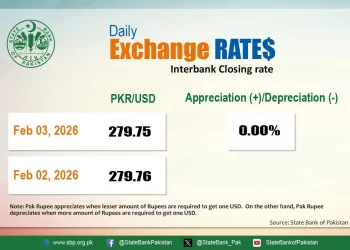Pakistan’s headline inflation is expected to stay within the 4-5% range in December, the Finance Division projected on Friday.
In its ‘Monthly Economic Update and Outlook’, the ministry highlighted that the “hard-earned” economic stability is expected to persist on the back of remittances and export inflows with decent imports.
“This will be complemented with exchange rate stability and contained inflation – which is anticipated to remain within the range of 4.0- 5.0% for December 2024,” read the report.
Inflation in Pakistan has been a significant and persistent economic challenge. In May of last year, the CPI inflation rate hit a record high of 38%. However, it has been on a downward trajectory since then.
Pakistan’s headline inflation hit its lowest level since May 2018, clocking in at 4.9% on a year-on-year basis in November 2024, a reading that was also below that of October 2024 when it stood at 7.2%, showed Pakistan Bureau of Statistics (PBS) data.
The Finance Division in its report was optimistic that further easing of monetary policy in December could stimulate economic activity.
Earlier this month, the Monetary Policy Committee (MPC) of the State Bank of Pakistan (SBP) decided to cut the policy rate by 200 bps to 13%. Cumulatively, the policy rate reduced by 900 bps since June during the last five consecutive monetary policy decisions.
Pakistan’s inflation anticipated to lower further in December, easing cycle likely to continue
The Finance Ministry also noted that the rising demand for credit, especially from the private sector, is a positive signal of growing confidence in the economy. “This momentum is poised to accelerate, fostering higher production levels and enhanced economic output in the coming months,” it said.
Moreover, improved fiscal performance during July-October, driven by higher revenues and prudent expenditure management, is expected to create fiscal space for development spending and support sustainable economic growth, going forward, it noted.
Agriculture
The report emphasized that the government is cognizant of achieving the crop production targets by facilitating the farmers to achieve the desired production level.
“However, weather conditions may pose challenges, as below normal rainfall may lead to water stress during the critical emerging stage of Rabi crops like wheat and barley, especially in rain-fed agricultural zones,” it said.
Large-Scale Manufacturing (LSM)
The ministry noted that despite challenges in certain sectors that remain in negative territory, the robust performance of high-weighted sectors continued to drive LSM in October.
“Further, the automobile and cement sectors exhibited strong performance in November, providing a critical boost to their allied industries. The potential ripple effect and the interconnectedness of industrial sectors may reinforce a broader growth trajectory,” stated the report.








